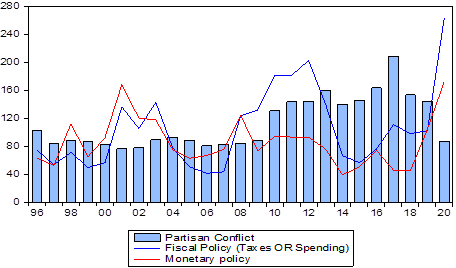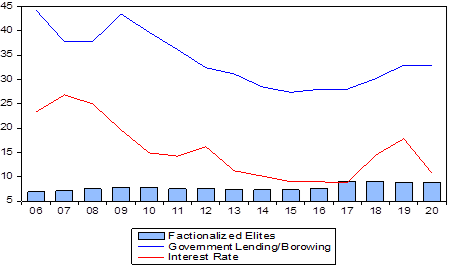Economy and Political Partisanship in the United States: Any lesson for Turkey?
The reality about the United States political waters is fast becoming a semblance of rapidly heightened gap between the conservatives and liberals or the Republicans and Democrats. Without mincing word, the just concluded United States of America’s election further affirm reiterate the concern of partisan conflict resulting from the sharp divide on political ideologies. This recent evidence from the Biden-Trump election tussle supports the age-long Pew research into the depth of political divide in the United States (Pew Research Center, 2020).
Although studies have indicated a handful of benefits associated with a politically divided/polarized society (Gallup, 2020), it negative effect on the economic system, congressional effectiveness, traditional and religious institutions, family institution, and many more is increasingly becoming unbearable. In specific, some major fiscal policy deals and/or disagreements such as from health policy, tax policy, and in recent time, the COVID-19 relief package are all difficult struggles lubricated by the sharp political divide in the country. For instance, the trend between 1996 and 2000 (Figure A) virtually depicts a period of meaningful correlation between partisan conflict, fiscal policy, and monetary policy in the United States. The same interactions are seen in 2003 until 2019, thus indicating the socio-economic dangers associated with unmitigated partisan conflict in the country.

Figure A: Political partisanship and policy mix in the United States.
Source: Data for fiscal and monetary policy are sourced from Economic Policy Uncertainty (EPU) while Federal Reserve Bank of Philadelphia is the source of partisan conflict data.
Importantly, the Turkish’s relatively young democracy stand a chance to learn from the obvious polarization of the United States political climate. In the case of Turkey, the trend of factionalized elites is seen to mimic the pattern of the country’s interest rate (as a proxy for monetary policy) and government lending/borrowing profile (a proxy for fiscal policy) especially between 2007 and 2019 (see Figure B). Thus, the implication of this illustration is that an effective and inclusive policy that include citizens’ engagement, reorientation and inter-party communication and cooperation is essential for harmonious nation and a sustainable Turkish economy.

Figure B: Factionalized elites and policy mix in Turkey
Source: Data for fiscal and monetary policy are sourced from Economic Policy Uncertainty (EPU) while Federal Reserve Bank of Philadelphia is the source of partisan conflict data.
From
Andrew A. ALOLA (PhD)
Assistant Professor, Department of Economics and Finance.
References
Gallup (2020). The Impact of Increased Political Polarization.
https://news.gallup.com/opinion/polling-matters/268982/impact-increased-political-polarization.aspx. (Accessed 22 December 2020).
Pew Research Center (2020). What Biden and Trump supporters tell us in their own words about America’s political divisions.
https://www.pewresearch.org/fact-tank/2020/12/17/what-biden-and-trump-supporters-tell-us-in-their-own-words-about-americas-political-divisions/. (Accessed 22 December 2020).



